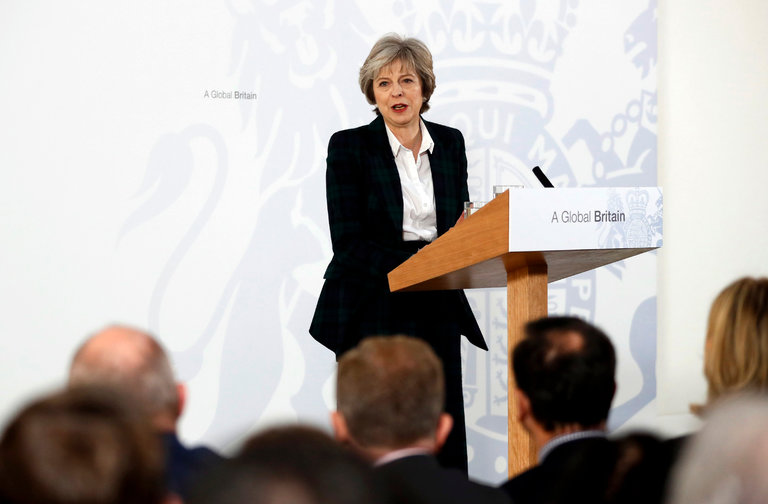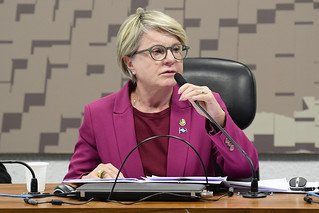In ‘Brexit’ Speech, Theresa May Outlines a Clean Break for U.K.
LONDON — In a speech that could define Britain’s relations with its neighbors for decades to come, Prime Minister Theresa May on Tuesday charted a course toward a clean break with the European Union, calling for the country to abandon the single market after more than four decades of integration with the Continent.
Mrs. May emphasized Britain’s determination to regain control of migration from the European Union and rejected the supremacy of the European Court of Justice, even at the risk of losing unfettered access to the single market, but she also said she wanted to procure tariff-free trade with the bloc and to keep parts of its customs union.
The long-awaited speech was a shift for Mrs. May, who had dropped heavy hints about her thinking but had refused to outline publicly how Britain would leave the bloc after voters supported a withdrawal in a June referendum.
After months of stressing that there was no “binary divide” over Britain’s membership of the single market, she explicitly ruled out staying a member, arguing that it was impossible for a Britain that controlled its borders and set all of its laws.
“Let me be clear,” she said, adding that any agreement would be sent to both houses of Parliament for approval, “What I am proposing cannot mean remaining in the single market.” The speech appealed for a new relationship with Continental Europe, with Mrs. May saying she wanted “a new and equal partnership — between an independent, self-governing, global Britain and our friends and allies in the E.U.”
“Not partial membership of the European Union, associate membership of the European Union, or anything that leaves us half-in, half-out,” she added. “We do not seek to adopt a model already enjoyed by other countries. We do not seek to hold on to bits of membership as we leave.”
Nevertheless, she warned that if Britain were locked out of European markets, it would feel free to cut corporate taxes and change its economic model to remain competitive. Mrs. May’s intervention represents an opening gambit in a hugely complex negotiation. “The United Kingdom is leaving the European Union,” she said. “My job is to get the right deal for Britain as we do.”
Reaction from opponents of a British departure from the bloc — commonly known as Brexit — was swift and harsh. “Theresa May has confirmed Britain is heading for a hard Brexit,” said Tim Farron, the leader of the centrist Liberal Democrats. “She claimed people voted to leave the single market. They didn’t. She has made the choice to do massive damage to the British economy.”
Jeremy Corbyn, the leader of the Labour Party, focused on the Conservative Party promise to cut corporate taxes to attract businesses, on the Irish model, which the chancellor of the Exchequer, Philip Hammond, proposed on Sunday.
“Theresa May has made clear that she is determined to use Brexit to turn Britain into a bargain-basement tax haven on the shores of Europe,” Mr. Corbyn said. “She makes out this is a negotiating threat to the 27 E.U. countries, but it’s actually a threat to the British people’s jobs, services and living standards.”
The response from European leaders was more muted. Frank-Walter Steinmeier, the German foreign minister, welcomed the fact that Mrs. May “finally has given a little more clarity over the British plans,” and he called on the 27 other member countries to unite to preserve the single market.
Even before the speech, Mr. Farron had accused Mrs. May of taking Britain toward “a destructive, hard Brexit,” with consequences that “will be felt by millions of people through higher prices, greater instability and rising fuel costs.” His party pointed on Tuesday to the impact of the slump in the value of the pound, which helped push up inflation in December last year to 1.6 percent, its highest rate since July 2014.
While currency markets had been jittery in recent days in anticipation of the speech, the pound rallied by as much as 1.5 percent after Mrs. May began talking, suggesting her remarks — leaked to British news outlets over the weekend — had already been accounted for.
Mrs. May’s speech, delivered in the grand surroundings of Lancaster House in London, was the most closely watched statement on European policy since January 2013, when the prime minister at the time, David Cameron, promised to hold a referendum on European Union membership.
Mrs. May, who came to power after the referendum, has promised to begin the two-year negotiation process on British withdrawal by the end of March, putting the country on course to leave the European Union in 2019. The prospect that Britain would remain part of the single market had been fading since October, when Mrs. May told the Conservative Party conference that she would insist on complete control of migration from European Union countries and on release from the rulings of the European Court of Justice.
That stance is generally regarded as incompatible with membership of the European Union’s single market, which has made the free movement of people — as well as goods, capital and services — one of its bedrock principles, and which relies on the court to arbitrate.






